Martin Edwards's Blog, page 27
April 10, 2024
Basil Rathbone - and the Hollywood Baskervilles - guest post by Elizabeth Crowens

Today, a guest post from Elizabeth Crowens, whose new book (above) has just been published by an excellent American firm, Level Best Books.
'Growing up as a child in the Midwestern United States, we didn’thave cable channels with over one hundred channels or a variety of streamingservices. All we had were the three major network stations on an analoguetelevision set, and when my hometown had access to PBS programming, we set upan antenna to get a fourth channel. We got very few British shows except for oldHammer horror films during Saturday afternoon television after the cartoonswere over or midnight showings. In short, a very limited viewing selection comparedto now, and as a kid with a limited allowance, going to a matinee at a localtheater entailed a car ride and didn’t happen all that often, especiallywithout a parent chaperone.
Back then, my only exposure to Sherlock Holmes was the BasilRathbone films, co-starring Nigel Bruce as Doctor Watson. I’m almost embarrassedto admit that I wasn’t even aware of Jeremy Brett’s masterful interpretation ofHolmes in the Granada Television series until years later. When I studiedfilmmaking and film history and lived in larger cities like New York and LosAngeles, did I realize that the fictional character of Sherlock Holmes won theGuinness Book of World Records for having more actors portray him in all media,including film, theater, television, and animation. The only other fictionalcharacter who surpassed Holmes was Dracula, but he is classified more as asupernatural creature rather than a fictional human.
When it came to developing the concept for Hounds of theHollywood Baskervilles, my first book in the Babs Norman Golden Age ofHollywood Mystery series, I needed to give my rookie private detective partnerstheir first big celebrity client. Since I had previously written three novelsin an alternate history series exploring the Spirtualist and paranormalinterests of Sir Arthur Conan Doyle, I was familiar with the Sherlockian canonand many of Conan Doyle’s other works, including ghost stories, so it madesense that if I started my new series in 1940, I should carry over the Holmestheme and have Basil Rathbone hire my detectives.
Next, of course, I had to watch as many of Basil’s films as I could.Being as prolific as he was, he had quite a filmography, including asignificant number of projects where he played the villain rather than the hero,such as The Adventures of RobinHood, The Mark of Zorro, and Captain Blood. I discovered Basilhad significant experience on the New York stage, preferring Shakespeare,before getting his lucky break in Hollywood.
When I made a deep dive into his biographical andautobiographical material, I soon discovered that Basil was also a seriousanimal lover. At any given time, he owned five dogs, several cats, andcanaries. One of his dogs, a Cocker Spaniel named Leo, left an indelibleimprint. Basil’s best friend, Jack Wiltern, was walking Leo along with twoother Westies. While crossing a busy street in Los Angeles, a speeding car hitJack and the dogs. Leo broke his leg. The Westies made it to the curb unharmed,but Jack later died of his injuries. Mentioning this true and tragic story in my novel,I also had Leo disappear. Basil became distraught every time he thought of hismissing dog, because it also reminded him of his dear friend’s deadly incident.Thus my premise was born...'
April 8, 2024
Bullets over Broadway - 1994 film review
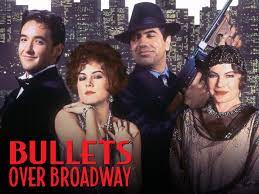
At his best, Woody Allen is a witty and clever writer and the 1994 film Bullets over Broadway, which he scripted (and later turned into a jukebox musical) benefits from one of his strongest screenplays, co-written with Douglas McGrath. Woody Allen also directs, but he doesn't feature in the cast. The film was nominated for no fewer than seven Academy Awards, with one win, for Dianne Wiest's witty performance as the fading, alcoholic star Helen Sinclair.
The story is set in Prohibition-era New York and concerns God of Our Fathers, a play written by the earnest young idealist David Shayne (John Cusack). Desperate to see his lights (and Woody Allen's skewering of the hopes and dreams of authors is as effective as it is entertaining, no doubt because of his empathy for them), he allows himself to be persuaded to agree to the casting of a brash and talentless chorus girl Olive (Jennifer Tilly, also nominated for an Oscar, and also very good indeed) in a key role, in return for her gangster boyfriend putting up the money so that the play can have a run on Broadway.
The cast of the play includes the gluttonous British actor Warner Purcell (Jim Broadbent, enjoying himself hugely) and dog-loving Eden Brent (Tracey Ullman). Jack Warden and Rob Reiner are in the supporting cast and make the most of heir roles. Warner develops a dangerous interest in Olive, while David finds himself drawn to Helen, and the two affairs give rise to some very funny moments.
There's a lot of pleasure to be had in following the twists and turns of a very well-crafted storyline. There are plenty of jokes about the nature of the writing life and what it takes to make a play work on Broadway. This is a film which deserved its success; it's very good light entertainment indeed.
April 5, 2024
Forgotten Book - Murder in Full Flight
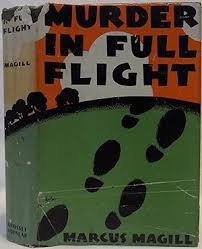
I wouldn't mind betting that quite a few of my knowledgeable blog readers have never heard of Marcus Magill, let alone read any of the books. Not so long ago, that was also true of me, but I was given the chance to acquire an inscribed (to a 'Mrs Sprott') copy of Murder in Full Flight, and I couldn't resist. But who was Marcus Magill? The answer is that this pen-name concealed the identity of a curious writing duo, Joanna Elder Giles and Brian Hill.
The best information about this pair is to be found in this article by Thomas Hawlery for the British Library. As is stated, Joanna was in 1930 one of only 40 women in Britain who owned their own private plane and the love of flying is abundantly evident in this novel. I also found a good account in a blog previously unknown to me, Speedy Mystery. Thanks to Clint Stacey, I have a letter from Magill, clearly Brian Hill rather than Joanna, and he reviewed under that name for a while. The fact that he associated himself so closely with the Magill name leads me to guess that he did most of the writing, while Joanna did the plotting, and amongst other things wrote or supplied the information for the various scenes which take place in the air.
The story is an odd one and is mildly amusing in tone. We're introduced to Simon Nicholson, who has come up with a very important invention and - foolish chap - failed to patent it. When we learn that his plans are much sought after, and only one copy exists, two things are fairly predictable. One, that Simon will be murdered. Two, that the plans will go missing.
The first part of the story is the best, while the airborne scenes are good but, I felt, over-done. And the book definitely goes on far too long, so that I lost interest long before the end in what turned to be as much a light-hearted thriller as a detective story. A pity. But the authors do sound to be very intriguing and I'd like to know more about them (and also to read their few short stories). One oddity is that this book is supposed to have been published in 1933, but the inscription in mine has a date from 1932. It's certainly a pretty rare book. I can't find an image of the UK dustjacket anywhere - I found the American jacket image on the internet. The pair seem to have co-written eight novels, but I think they were running out of steam by the time this one appeared.
April 3, 2024
News about The Life of Crime and The Golden Age of Murder
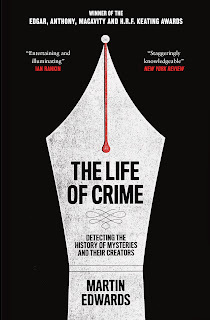
I'm delighted to bring exciting news. Well, exciting to me, anyway! I'm happy to announce not one but two new editions of my most successful non-fiction books, both published by HarperCollins. First, I'm glad to say that the paperback edition of The Life of Crime, due to appear in May, has been expanded very significantly (not that it was a slim volume to begin with). The paperback is about 7000 words longer than the hardback, with the result that more than 200 additional authors and works have been included.
A book as wide-ranging as The Life of Crime ,which covers the whole history of crime fiction across the globe, can never cover every single author of note, of course, but I've always been keen that it should be as representative as possible. So I'm hugely grateful to my editor David Brawn for agreeing to the update as well as for his splendid work on updating the indexes (a big task, believe me).
You may wonder why I've undertaken this extra work. The hardback received a fantastic reception, in terms of reviews, sales, and awards, and I'm deeply appreciative. Of course, it's tempting to say, 'If it ain't broke, why fix it?' but the fact is that I want all of my books to be the best they can possibly be - it is never possible to achieve perfection, but there's no harm in striving for it.
This is what David says about the book in the press release: '‘For an author as prolific as Martin Edwards, it can be hard to identify their magnum opus. The Life of Crime, however, is an extraordinary feat of both scholarship and readability, the culmination of a lifetime devotion to studying the genre, and was deservedly selected in the books of the year by publications as widespread as the New York Times and the Spectator. The Times rightly described Martin as “the closest thing there has been to a philosopher of crime writing”, and I’ve no doubt that this is indeed a genuine magnum opus – and now will be even more magnum in paperback!’
And there is more news. HarperCollins have commissioned me to write a new edition of The Golden Age of Murder to celebrate the tenth anniversary of the book's publication next year. This is another book that means a great deal to me, and I'm looking forward to developing it further - again, mainly by way of including more material about the Detection Club and the Golden Age of detective fiction between the wars. So if there's anything relevant to the existing book that you think could usefully be developed in the new edition, feel free to let me know, so that I can take feedback into account before starting work...
April 1, 2024
In Search of John Ferguson - and Ferguson's Gang
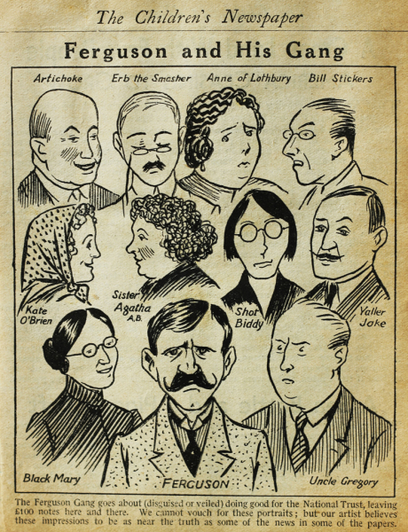
Writing this blog continues to give me great pleasure. That would be so even if hardly anyone ever looked at it, but in fact I've gained immeasurably by hearing from many people who read the blog or my other writings, some of whom I've enjoyed meeting, some of whom I may never meet, but all of whom have something interesting to say. Their messages, as well as their comments on the blog, are always fascinating.Someone who got in touch with me recently is Hilary Tolputt. She is interested in John Ferguson, whose books - such as and Death Comes to Perigord - I find appealing. She told me she ' became interested in John Alexander Ferguson when I was researching schools in Folkestone including Eversley, the private girls’ school where Ferguson was Chaplain from 1915 to 1938. The school was at Lymington between1935-38 and Ferguson oved there with the school. The search widened and I found more about Ferguson’s life in Callander, Glasgow, Guernsey, Drumtochty, Culross and Lymington.'
Hilary pointed out an interesting apparent connection between Ferguson and 'the women who were involved in raising and presenting money to the National Trust in the late 1920’s and 1930’s. Known as Ferguson’s Gang, they indulged in somewhat strange rituals and had bizarre ways of presenting the cash which gave considerable publicity to the National Trust projects which they supported.' Did Ferguson give his name to the gang? One possible clue is that the leader of the gang was Peggy Pollard (nee Margaret Gladstone), who attended Eversley School.
Hilary asked me if I knew anything about Ferguson's papers that might cast light on this. I'm afraid I am not aware of any John Ferguson archive (his full name was John Alexander Ferguson, by the way). However, I know that a great many people who read this blog are very well-informed about all manner of things. So if any of you can offer any clues, Hilary and I would be delighted to hear from you!
March 29, 2024
Forgotten Book - Tea on Sunday
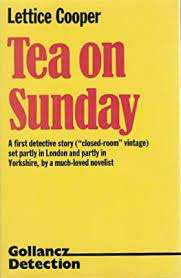
This has been quite a month for the blog. March isn't over yet, and there have already been over 120,000 pageviews, by some distance the highest monthly figure since 'Do You Write Under Your Own Name?' began, way back in 2007. I'm very grateful for this level of interest, and it seems clear that Friday's Forgotten Book is a popular feature. Rest assured, I have plenty more obscure titles lined up for discussion!
Today's pick is Tea on Sunday. A low-key title for an equally low-key crime novel published in 1973, the only venture into classic detective fiction by Lettice Cooper, a mainstream novelist and critic; my copy is inscribed by her to another critic, Margery Fisher. This book was published by Gollancz, and the dust jacket suggests that it's a locked room mystery - but it isn't. What it is is a well-made, character-driven story that I found very readable.
I'd never heard of Cooper, I must admit, but it turns out that she was a well-regarded writer who lived to a ripe old age, dying in 1994 at the age of 96. She was born in Eccles, grew up in Leeds, studied at Lady Margaret Hall, Oxford, and then went back to Yorkshire to work in her father's engineering firm. Suffice to say that I think she mined a lot of personal experiences for her portrayal of the murder victim in this story, Alberta Mansbridge. We meet Alberta in a prologue, just before a tea party to which she's invited eight people. One of them arrives early - and strangles her.
The investigation is conducted by a very likeable detective, Inspector Corby, and the suspects are well-rounded, especially Alberta's nephew, Anthony. There is a touch of P.D. James about the writing, and my interest was maintained throughout. Corby's investigations take him to Yorkshire, and again one has a sense of Cooper drawing on places she knew well for the background.
The murder plot is not exceptional - I figured out the culprit's identity at a relatively early stage. My guess is that Cooper felt inhibited by a desire to present credible characters, so that although there are eight suspects, some of them are pretty obviously not realistic candidates for the role of murderer. The book doesn't seem to have made much impact, with no paperback edition, and Cooper went back to writing mainstream fiction. But this solitary detective story is significantly better and more enjoyable than many a genre debut and in my opinion deserves better than the total obscurity into which it has fallen.
March 27, 2024
Burnt Offerings - 1976 film review

This is a blog about crime writing and crime fiction in its various forms, but of course the boundaries between crime and other genres, such as the ghost story and the horror story, both of which I'm keen on, are blurred. As a teenager I used to read the short horror story anthologies published by Faber, Fontana, and Pan, and I still think that (with various exceptions) the short form is the best medium for horror fiction - but of course there are many good horror films too.
A fairly good example is the 1976 film Burnt Offerings. I watched it a day after watching the very recent Brandon Cronenberg film Infinity Pool, which I felt began well but deteriorated badly. Burnt Offerings is subtler and, I think, much more effective, even if though it has some flaws. Interestingly, the screenplay was co-written by William F. Nolan, who also wrote a great deal of crime fiction and was once nominated for an Edgar award. He was a very capable storyteller, and this is evident in the film.
Perhaps the most remarkable thing about Burnt Offerings is that Oliver Reed is cast as a normal family man. Not a drunk, for once, nor a sexually depraved monster. He and his wife (Karen Black) and their son are offered the chance to rent an atmospheric but dilapidated house in the middle of nowhere for a pittance by the creepy owners who - even more creepily - say that the old lady who lives at the top of the house will continue to live there. The warning klaxon really should be sounding at this point, but of course our protagonists find this an offer that is too good to refuse. Big mistake.
There are a lot of haunted house movies, but this is above average fare and in recent years, critics have seen it as offering sly comment on modern day materialism. I'm not sure how far I go along with that, but given a choice between Burnt Offerings and Infinity Pool, I know which film I'd rather watch. Incidentally, Bette Davis features in the cast, but really, the old house is the star.
March 25, 2024
Making an Exhibition of...All the Lonely People
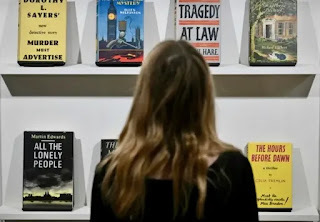
When I walked into Cambridge University Library's new 'Murder by the Book' exhibition for a preview last Thursday evening, I didn't expect to have one of the most gratifying experiences a crime novelist could possibly hope for, but so it proved. I was greeted by the sight of my very first novel, All the Lonely People, included in a selection of 100 landmark titles in 20th century British crime writing, in a display case alongside the likes of Dorothy L. Sayers' Murder Must Advertise, Cyril Hare's Tragedy at Law, Nicholas Blakes' The Beast Must Die, and Celia Fremlin's The Hours Before Dawn. Blimey! A truly memorable moment.
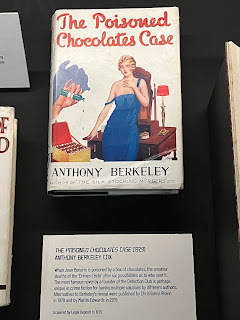
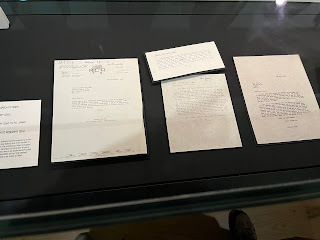
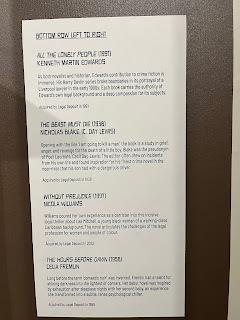
This wow-factor experience was enhanced when I later discovered that the photo at the top of this post has accompanied various news stories about the exhibition here and overseas. Moments like this really do make all the challenges that accompany any writer's career from time to time seem utterly worthwhile. Seeing the book in such exalted company was something I could never have imagined when I first wrote it.
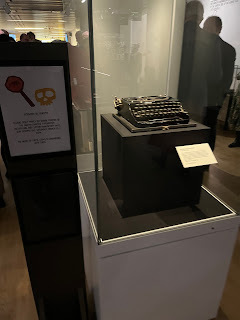
I was also pleased to see copies of my anthology Murder by the Book and also Howdunit on sale by the door to the exhibition, but that was only the start of a very good evening, studying a cleverly conceived and fascinating exhibition. Nicola Upson who has curated the exhibition, gave an excellent speech and I was also glad to catch up with a number of friends including Ayo Onatade, Christina Koning and Richard Reynolds. The exhibition runs for three months and features amongst other delights Agatha Christie's typewriter and dictaphone, as well as the manuscript for Curtain. I was especially fascinated by the correspondence relating to P.D. James's first novel. It goes without saying that I strongly recommend Murder by the Book!



This made a wonderful start to a short but exhilarating trip to the East Midlands. Madingley Hall, which I discovered eighteen months ago when invited to give a lecture there by Sophie Hannah, was an excellent base: it's a study centre but also a delightful hotel. Friday was spent on my first ever visit to Rutland, England's smallest country, in the company of local resident David Whittle, Edmund Crispin's biographer. Luckily the weather stayed fine and we started with a lovely walk at Rutland Water - I was intrigued by Normanton Church, which was preserved when this massive lake/reservoir was created. Then came lunch at Uppingham, a busy little market town (and site of the school attended by E.W. Hornung, creator of Raffles) and a visit to Oakham, including the fascinating and truly ancient hall that is Oakham. Finally, a look at Welland Viaduct, which is much less well-known that the Ribblehead Viaduct, but even longer.

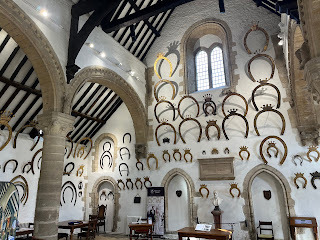



Saturday was devoted to a visit to ace book collector Clint Stacey and his family in Stamford. Clint has a great fund of knowledge about classic crime fiction and his collection is quite wonderful. I really enjoy seeing other people's book collections and this was a great way to round off a brief visit to a lovely part of the world. Here is a rare R.T. Campbell/Ruthven Todd signature and a nice inscription from George Hardinge (aka author George Milner) to Anthony Berkeley:
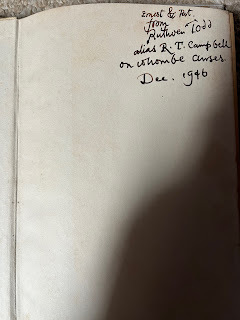
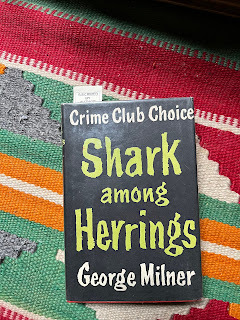
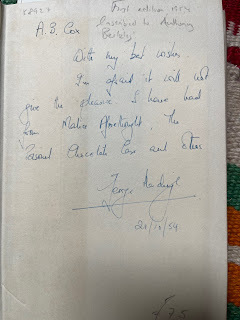
March 22, 2024
Forgotten Book - The Siege of Trencher's Farm
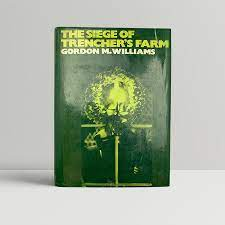
Crime fiction is almost inevitably linked to violence of one kind or another. There aren't many truly victimless crimes and violence takes many forms, psychological as well as physical. For those of us who find violence horrific, crime fiction - when it is well written - offers readers, among other things, a means of coming to terms with a better understanding of violence and its well-springs. And I think it's good for writers to think about the way they deal with violence in their books; that is not in any way to suggest that violence should be excluded or sanitised, although personally, as a writer and as a reader I have no real interest in graphic descriptions of acts of violence.
Many years ago I watched the film Straw Dogs. I tend not to like Sam Peckinpah's films (all I can now recall of Bring Me the Head of Alfredo Garcia, which I watched as a student, was that it was particularly dreadful), but anything starring Dustin Hoffman and Susan George had to be worth watching. However, the graphic violence in the movie didn't appeal to me at all. So I steered well clear of the source novel, The Siege of Trencher's Farm by Gordon Williams.
However, I liked Williams' Hazell stories, written with Terry Venables under the name P.B. Yuill and his stand-alone Yuill The Bornless Keeper, was interesting. I discovered that one of his novels was shortlisted for the very first Booker Prize and that Ian Rankin has a high regard for The Siege of Trencher's Farm. I was deterred by the fact that Williams supposedly wrote the novel in just nine days, but encouraged by the fact that he hated Straw Dogs and that for his part Peckinpah described the book as 'rotten'. So I've given it a go.
The novel was published in 1969 and is, I think, significantly different from the film. It's a flawed novel, but the account of a group of local men rising up in anger against an American and his English wife who give shelter to an escaped child killer in an isolated Dartmoor village cut off by snow has a great deal of tension. There's a Lord of the Flies feeling to the story. There is still quite a lot of violence, and the book might have benefited from more work, but it has a visceral power. I have no doubt that Williams was making valid and perfectly arguable points about our darker instincts, even if one wouldn't agree with all of his attitudes. I don't think it's a masterpiece, but it's definitely an improvement on the film.
March 20, 2024
Paul Charles - Adventures in Wonderland - review
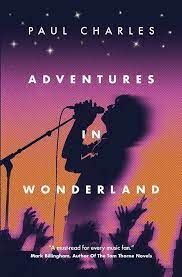
Paul Charles has combined a highly successful career in music as an agent, promoter, manager, and songwriter (one of his numbers was covered by Norah Jones) with a distinct career as a crime writer. He and I first met in Philadelphia, of all places, at a Bouchercon in the late 90s and we hit it off right away. We don't manage to meet up too often, because of our other commitments, but I always enjoy his company. We had a very enjoyable afternoon together in London recently, when Paul told me about his recently published memoir Adventures in Wonderland.
I've now devoured the book. As you'd expect from a very experienced novelist, it's as readable as it's entertaining. Paul has had many famous clients, ranging from Van Morrison and Elvis Costello to Ray Davies and Tanita Tikaram, and there are plenty of fun anecdotes about his encounters with the great and the good (and also the not-so-good) of the music business.
It's clear that Paul's a very shrewd businessman, but his humility and wisdom shine through the pages. I know that some people do well, at least in the short term, by behaving ruthlessly, but the most successful business people I've met over the years - and I've met quite a few - are neither arrogant nor exploitative. Paul is a very good example and some of his anecdotes illustrate the merit of one of his other strengths - persistence.
There are a number of references to Paul's crime writing, and a good chapter about Colin Dexter. For those of you who don't know Paul's fiction, I can recommend it. And I'm equally enthusiastic about Adventures in Wonderland.



